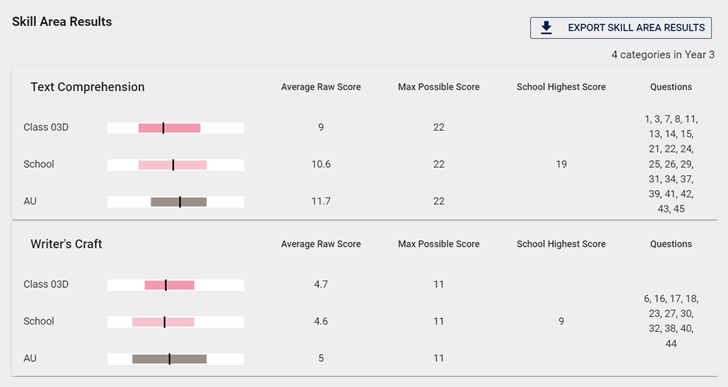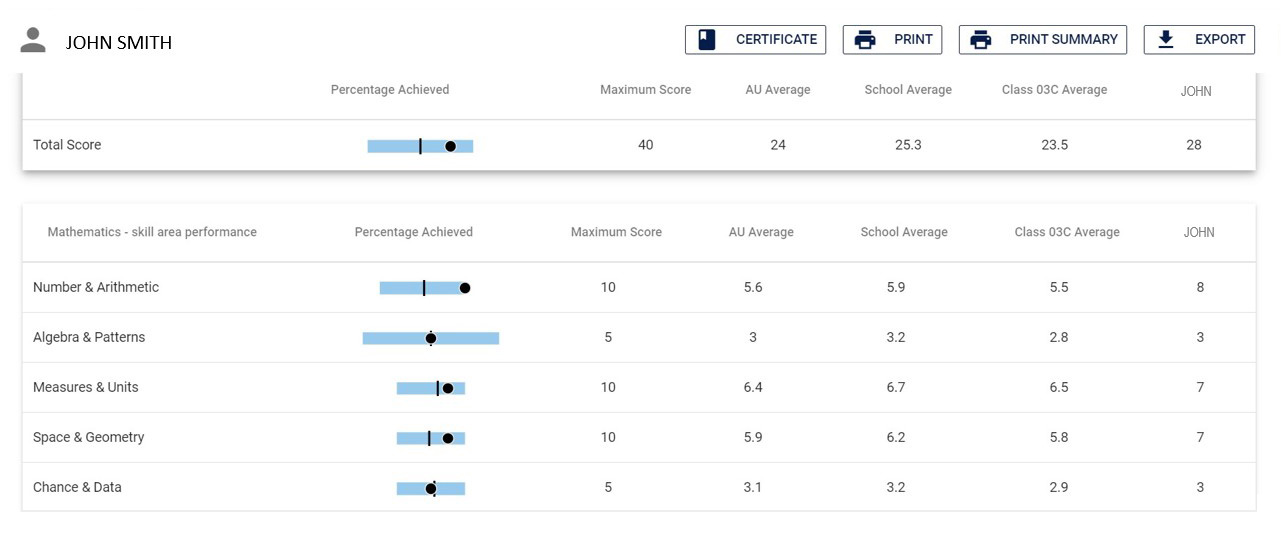5 ways ICAS can help you get ahead with your students’ learning

According to a survey by TeacherVision in 2021, 70% of teachers are worried that their students are behind.5 That’s a big percentage, and there’s a good chance you may be one of them.
As a teacher, what else can you do ensure your students are properly progressing through their learning journeys? An extra-curricular academic competition like ICAS may not come to mind, but you might be surprised at how it can help you and your students get ahead.
Here are five key ways ICAS can help you advance your students’ academic progress.
1. Get extra performance data that validates whether they really are behind
Thankfully, our numerous worries often don’t materialise. And this may be the case for your students being behind, so it’s important to first validate whether the worry is actually true.
As a standardised skills test that covers areas relevant to the curriculum, ICAS gives you another data point that shows how your students compare against the nation. This kind of objective performance data can be difficult to come by elsewhere, and because the tests are created by a team of experienced teachers, psychometricians and education experts, you can guarantee its quality. Combining this performance data with data from other assessments helps you to build a sharp picture of each students’ academic progress, helping you take stock of where they are.
 Skill area results for a class, from the ICAS results portal
Skill area results for a class, from the ICAS results portal
Bryan Nixon, Head of Whitby School in Connecticut, succinctly explains how standardised testing helps his team to compare students:
“We view standardised testing data as not only another set of data points to assess student performance, but also as a means to help us reflect on our curriculum. When we look at Whitby’s assessment data, we can compare our students to their peers at other schools to determine what we’re doing well within our educational continuum and where we need to invest more time and resources”2
2. Identify knowledge gaps and address them
ICAS results are broken down by skill area for both your class and individual students, so after comparing these results against other assessment data collected throughout the year, you’ll be able to spot any specific knowledge gaps that need to be addressed. Whether it’s arithmetic, text comprehension, interpreting scientific results, or another key skill area, you’ll know exactly what needs to be worked on, and can create targeted lesson plans to address the gaps. You may find you need to go over some foundational elements for the entire class or a small subset of students, to lay down the base learning blocks that allow them to keep building their skills. You may decide to re-teach skills from earlier in the term or jump ahead for particular skills in which they’re excelling.
 Skill area results for a specific student, from the ICAS results portal
Skill area results for a specific student, from the ICAS results portal
ICAS results can help you validate your concerns, evaluate your lesson plans, and make the necessary changes to get your students up to speed. Former teacher (and current Customer Experience Manager for Janison) Mary-Anne used to do this for the entirety of Year 3, comparing their ICAS scores to the thousands of other students in Australia, validating this with additional assessment data, and then adjusting her learning plan as a result.
3. Strengthen their curriculum-based skills through testing
The testing effect (also known as retrieval practice1 and active recall) is a phenomenon in which learning is enhanced through the act of testing. It has shown to improve retention of information, aid the transfer of knowledge to new concepts, help with organising knowledge in the brain, and has many other benefits that strengthen learning. 3 So when your students are taking the ICAS tests, they are also gradually getting ahead with their learning by strengthening their curriculum-based skills.
One meta-analysis of the testing effect showed that students who take practice tests often outperform those who don’t.4 As they work through each question, the key concepts and skills are being reinforced all the while, fortifying connections between neurons and creating entirely new pathways. As a result, some students may find that the ideas or skills suddenly “click.”
4. Develop their higher-order thinking skills
As a teacher, you know that learning is about so much more than just memorisation. For your students to advance through their learning journeys (and their lives generally), they’ll need to regularly apply their higher order thinking skills. They must analyse, evaluate, critique, think creatively, solve problems, and demonstrate a range of other higher-order thinking skills that allow them to grow and become confident self-learners.
The ICAS tests are designed specifically to test and strengthen these skills, stretching students’ abilities and adding a new level of depth to their learning. The questions use real-world scenarios that students can relate to, inviting them to exercise their brains with progressively tough questions. As they furrow their brows in intense concentration, synapses lighting up like Christmas trees, they are developing a deeper understanding of the concepts in front of them and advancing their learning in the process. That’s one reason why ICAS is a tough test. If it were easy, students wouldn’t learn anything new (and neither would teachers).
5. Build their confidence and passion for learning
Tests can be nerve-wracking for many students, especially those that affect their education or career path. But as a low-stakes test, ICAS gives your students a platform to fail safely. Going into the tests, students should be made aware of how challenging it is, but also that there are no negative consequences for their results – just the chance to win accolades! The casual nature of the test means that they can just relax and have fun, and even be celebrated for their achievements. What could be better for helping to build their confidence? As they grow more assured, they are also able to move faster along their learning journeys – ahead, not behind!
ICAS gives your students another opportunity to achieve, which can help them to develop a lifelong passion for learning; an insatiable curiosity that inspires them to grow and achieve bigger and better things. This is vividly demonstrated in Adam Ritchie’s story, and if we looked hard enough, might also be found in the stories of numerous students who rose up to the challenges provided by their teachers, going on to make positive changes to the world.
References
- Jennifer Gonzalez, 2017, Retrieval Practice: The Most Powerful Learning Strategy You’re Not Using, Cult of Pedagogy
- Bryan Nixon, The Pros and Cons of Standardized Testing, Whitby
- Henry L.Roediger III, Adam L. Putnam, Megan A. Smith, 2011, Chapter One – Ten Benefits of Testing and Their Applications to Educational Practice, Psychology of Learning and Motivation
- Olusola O. Adesope, Dominic A. Trevisan, N. Sundararajan, 2017, Rethinking the Use of Tests: A Meta-Analysis of Practice Testing, Review of Educational Research
- Jenny Vanderberg Shannon, 2023, 7 Biggest Challenges for Teachers: According to Teachers, TeacherVision



